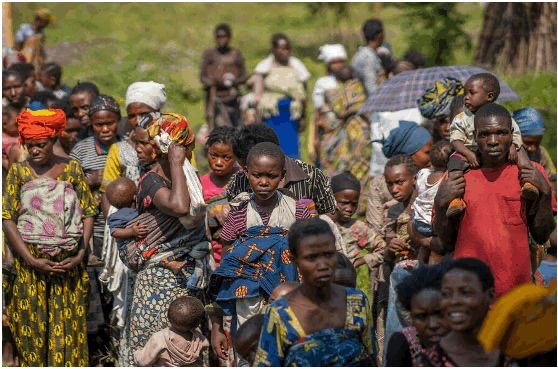Funding Cuts Threaten Millions with Hunger and Disease in DR Congo and Beyond
Written by: Prince Sedinam Aguissi
Tens of millions of people across the globe are facing the threat of extreme hunger and starvation, as significant reductions in humanitarian aid risk deepening crises in various regions, including the Democratic Republic of Congo (DRC). The World Food Programme (WFP) recently warned that declining donations—slashed by 40%—have put its global operations on the edge of collapse. As of March 2025, the UN agency has only received $1.57 billion of the $21.1 billion required for its work this year (WFP, 2025).
Rania Dagash-Kamara, WFP Assistant Executive Director for Partnerships and Innovation, emphasized the dire situation, stating, “WFP is prioritizing countries with the greatest needs and stretching food rations at the frontlines. While we are doing everything possible to reduce operational costs, we are facing a funding cliff with life-threatening consequences” (WFP, 2025).
The funding shortfalls are particularly impacting conflict- and climate-stricken areas, including Gaza, Sudan, Syria, and DRC. In South Sudan, for example, where two-thirds of the population faces food insecurity, WFP continues to support millions, but the outlook remains grim, especially with the approaching rainy season, which could exacerbate the food shortage. In DRC, the situation is worsening with a breakdown in health systems and a surge in infectious diseases.
The World Health Organization (WHO) has raised alarms over the growing health crisis in DRC’s eastern regions, particularly in areas like Goma. Recent clashes in Walikale have left nearly 700 people seeking treatment, but blocked aid and funding shortages have made it increasingly difficult for healthcare providers to reach those in need. Dr. Thierno Baldé, WHO Incident Manager for Eastern DRC, explained that the situation is dire, stating, “There is no possibility for access – no partner, nobody can really join that place” (WHO, 2025).
Meanwhile, cholera outbreaks near the Congolese border with Burundi have become a major concern. With one in ten infected individuals dying from the disease, health services are overwhelmed. The shortages of medical supplies and vaccines are only worsening the situation, with Dr. Baldé noting that despite efforts to deliver 20 tons of medical aid from Uganda, it remains a “drop in the ocean” compared to the scale of need (WHO, 2025).
The collapse of health infrastructure is compounded by a dramatic reduction in vaccines, putting at risk routine immunization programs. As Ms. Margaret Harris, WHO spokesperson, warned, “Infectious diseases don’t care about borders; they don’t care about elections and governments. If you don’t vaccinate everywhere, you’re going to be affected everywhere” (WHO, 2025).
The crisis extends beyond DRC, with neighboring countries like Rwanda, Uganda, Burundi, and Tanzania also at risk of falling into a similar predicament due to the transnational nature of the disease outbreaks. The United Nations Refugee Agency (UNHCR) further emphasized the danger, stating that nearly 13 million displaced people, including six million children, are at risk of losing access to life-saving health and nutrition care (UNHCR, 2025).
The humanitarian crisis in countries like Ethiopia is equally dire. In the Gambela region, funding cuts have forced the closure of refugee sites, with reports of severely malnourished children being discharged due to lack of staff and resources. “We’re talking about people here,” Allen Maina, Public Health Chief of UNHCR, stressed. “Men, women, and children, worried whether their parents will live to see another day” (UNHCR, 2025).
As global immunization programs face cuts, the ripple effects are felt worldwide, with the WHO warning that the ongoing funding shortages threaten not only the survival of millions in conflict zones but the stability of entire regions. The situation calls for urgent international intervention, as the global community faces the stark reality that the funding shortfalls are contributing directly to the suffering and deaths of vulnerable populations (WHO, 2025; WFP, 2025).
Read Also: The Voice of Africa is Now Inside the United Nations








